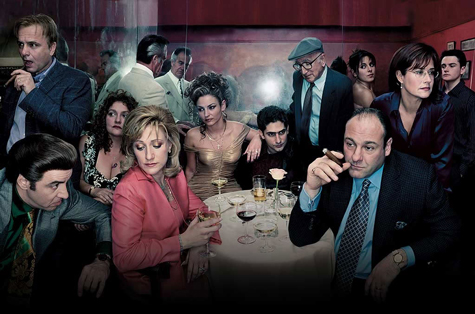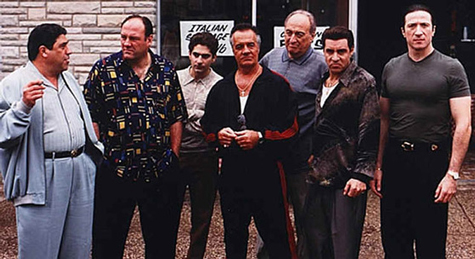
It’s been nearly a decade since The Sopranos concluded. On June 10, 2007, HBO aired “Made in America,” the final episode of David Chase’s gangster opus, and it was met with both rage and befuddlement from millions of viewers—but the show’s last scene has certainly expanded in clarity in the 9 years since.
It’s more lucid than ever to comprehend that we’ll never have another show quite like The Sopranos. The thought of a show having the same impact on the television landscape or the same amount of artistic integrity is nigh unfathomable, even considering how influential the show was. Yet, despite its seminal aura, The Sopranos’s most distinct and cerebral moments still remain inimitable in the current television milieu, and the show is still closer to being artwork than any other semblance of prestige television to arrive before or since.
The answer to the show’s singularity in a nutshell can be basically summed up as such: It arrived at the exact time and on the ideal network to truly do something transgressive with the Crime Fiction genre.
Firstly, it must be acknowledged that beyond a surface level, The Sopranos was hardly a show about mobsters. Yes, it was a show that focused on a New Jersey crime boss, his frequent lacerations with the law, and his crime family that was often even more violent than him. Also, yes, the writers certainly did their research on Mafia customs, alongside making reference to the mafia lifestyle that general audiences knew from pop-culture. Movies like The Godfather and Goodfellas were regularly referenced, a self-aware method to cater to a built-in audience, and many of the show’s actors were cast due to their experience in similar roles and backgrounds in rough neighborhoods.

Still, at the end of the day, The Sopranos was as much a show about gangsters as Watchmen was a comic about superheroes—it was far more intrinsically a show with more universal meanings, although also one that still understood the power of escapism.
Back when The Sopranos premiered in 1999, the days of the mafia were all but a memory in America. John Gotti had been incarcerated for years, and law enforcement had switched their priorities from apprehending wise-guys to stopping drug trafficking and street gangs—but the appeal of mafia culture stayed well within the American lexicon. The reason for this is likely because people are always quick to latch onto an appealing fantasy, and the late 90’s were a time when another facet of American culture was coming to an end: the hard-edged household patriarch.
The hard-drinking, dick-swinging, pseudo-intellectual middle-aged man who was the protagonist of countless works of fiction in previous decades was dissipating throughout the 90s. He was being replaced by the bro-ish, pot-smoking, affable geek archetype that Judd Apatow would mine for gold a few years later.
While we were still a decade away from the uproar in strong female-led television (i.e., Orange is the New Black), it was at least a little upsetting for baby-boomers to come to terms that Homer Simpson had become a better representation of America than Dirty Harry. In this sense, The Sopranos was a blatantly male fantasy, as not only did it envision an America where the Mafia was still relevant, but it used that template to give us a character that was indelible for the castrated stigma of the time: Tony Soprano.
Tony Soprano was not the first TV anti-hero, but he’s likely the first one whose character came disturbingly close to home. Soprano was a fucker, a liar, and a killer, and to top it all off, he probably swore too much also. Still, he was also pretty close to being a regular all-American guy. He had a family, was over-weight, lived in the suburbs, loved his friends, and enjoyed sports, movies and strippers with big tits. Still, he was a man with his damages, as he was prone to have bizarre dreams and even vivid hallucinations. Through this character’s psycho-drama, however, The Sopranos revealed its true ethos.
David Chase proved to be an artist that was all too willing to break the mold, and right from the very beginning. In the very first scene of the series’ pilot, we find Tony Soprano meeting with a therapist for the first time. Already, The Sopranos was inferring it was not interested in being a conventional gangland tale, as psychiatric help had been considered a red-flag for mobsters, but the show used the dynamic between Tony Soprano and his female psychologist Jennifer Melfi to really breakdown the alpha-male zeitgeist. It was a theme that had been dissected in the novels of John Updike and Philip Roth (read the latter’s Portnoy’s Complaint for the most blatant inference to this), but it had never been approached with this level of potency on the television medium before.
So, how did the show fare bringing complex subject matter to an untested medium? Ironically, the best case for The Sopranos’s success was that Chase and his crew didn’t have much television to inspire them. Despite the fact that Chase had been in the business for almost 30 years at this point as a television writer and producer, the show primarily took influence from films, with Federico Fellini being the most vocal inspiration for them. The director’s whimsical camerawork and dreamy style was largely borrowed for the series’ surreal dream sequences, and it also lent the series to having some really breathtaking narrative storytelling.
The writers had established, right from the outset, that they weren’t interested in telling clear-cut stories with spoon-fed endings; they wanted to leave plenty of plot-points up to the viewer’s imagination. Did Chris really meet his dead father in Hell in the episode “From Where to Eternity”? Did the Russian actually escape in “Pine Barrens”? Of course, what the hell happened after the final shot in the last episode? These open-ended plot points made for television that was subversive and provocative, while still allowing less-inclined viewers to follows the show’s serialized story.
Which brings us to another element of The Sopranos that made it so singular: the fact that so many of its episodes worked well as standalones. While critics have always been quick to acknowledge that The Sopranos changed television by being so heavily serialized, the show isn’t nearly as continuous as latter shows. While shows like The Wire, Breaking Bad, and Boardwalk Empire all benefitted from being watched in order, most episodes of The Sopranos function very well on their own. The series picked up newcomers through re-runs throughout its run, and most episodes were cumulative with their stories (albeit not often directly).
Was The Sopranos the television world’s first successful attempt to being a novel-esque narrative to the media? Absolutely, but it was also great television.
In the year’s since The Sopranos aired, there have arguably been better crime dramas to air on television (The Wire being the strongest case), but none have been quite as idiosyncratic or as mesmerizing in their filmmaking. David Chase brought viewers to a world that was strange, for sure, but it would be inaccurate to call it a microcosm of our reality. It was all too broadly familiar, so when these characters did horrible acts (brutality, infidelity, drug abuse), it felt so palpable, as they could have just as easily been another version of ourselves.
The Sopranos was best described as a reflection of American life, with the extremity turned up a notch. Even though The Sopranos captured a dying era in its throes, it will always remain relevant for any generation, as the possibility of becoming a monster is never as distant as one thinks.
Peter Foy is an avid reader and movie buff, constantly in need to engage his already massive pop-culture lexicon.

Well stated. In it’s way the Sopranos could almost be compared to an Eulogic Western, similar “Fantasy Space” for a decaying aspect of society.
Ha ha! You don’t know what “transgressive” means.
You meant “progressive”… but you said “transgressive”, which means “sinful”, “out-of-line”, or “a mistake”.
You used “uproar” when you meant “upswing” or even better “uptick” or perhaps even “rise” or “arrival”.
In no way could you say that Orange is the New Black caused any kind of “uproar”.
Dude, you are NOT adept at using words. You COULD be, but you don’t know what words mean. You just assume.
You assume you’re better with words than what you are. This is how you look ridiculous in front of grown adults. You, and your posts that have only 1 comment (aside from mine), are pathetic.
Also you’re pretending as though a mobster visiting a therapist was brand new. It was NOT.
The Sopranos is better thought of as the TV version of “Analyse This” and “Analyse That”, starring Robert De Niro as the mobster and Billy Crystal.
It shows how young you are that you don’t remember that The Sopranos was considered a rip-off of those movies at first.
It shows you’re a Millennial trying to sound smart about a TV show of you have no first-hand experience.
Which, aside from all the wrong words you’re using, makes you sounds like a naif. (Another word for you to look up)
Also you’re pretending as though a mobster visiting a therapist was brand new. It was NOT.
The Sopranos is better thought of as the TV version of “Analyse This” and “Analyse That”, starring Robert De Niro as the mobster and Billy Crystal as the therapist.
The Sopranos was an UNORIGINAL idea. No mould was broken.
It shows how young you are that you don’t remember that The Sopranos was considered a rip-off of those movies at first.
It shows you’re a Millennial trying to sound smart about a TV show of which you have no first-hand experience.
Which, aside from all the wrong words you’re using, makes you sounds like a naif. (Another word for you to look up)
And finally, of COURSE Sopranos has been replicated.
I can think of at least one greater TV show about crime that came after Sopranos and didn’t forget what the story was supposed to be about after Season 2.
It also became a bigger TV phenomenon, and had a conclusion that pleased everyone (not just the stragglers who were still watching.)
BREAKING BAD not only replicated but improved on, and over-shadowed, The Sopranos.
To pretend that the Sopranos isn’t just the first, flawed stab at a new generation of TV shows, but actually the GREATEST and UN-REPLICATABLE, is like sticking your fingers in your ears and ignoring all the evidence for Evolution to claim that a deity poofed this world into existence.
This is officially the most comments you’ll have on any of your misguided articles. And I’m here only because I’m enjoying your embarrassment and humiliation before a grown adult with a brain.
Other notes:
“narrative” and “storytelling” are the same thing. “Narrative Storytelling” is as meaningless a phrase as “ATM Machine” (Automatic Teller Machine Machine).
“it would be inaccurate to call it a microcosm of our reality. It was all too broadly familiar”. Again, you’re pretending to say two different things, but both these things mean the same thing. If something is a microcosm of our reality then it IS broadly familiar.
“as the possibility of becoming a monster is never as distant as one thinks.” Sopranos was about monsters. Not about becoming monsters. Breaking Bad was about BECOMING a monster.
There is an imaginary version of this article that still makes similar points without scoring so many own-goals. It might even really exist. But if it does, it’s not here, on “Criminal Element Blog for Losers” but on Vulture, or AV Club, or some reputable source that actually proof-reads its articles.
Verdict: You’re a hack.
Sentence: Being beaten to death with kitchen appliances… and then dissolved in a barrel of acid.